Providing inspired ramen/tsukemen from famous shops in Ogikubo, the holy land of Tokyo ramen history
Menkui Wanderer(麺喰ワンダラー)
column 2025.06.13 Ryouga Chinese noodle shop(中華そばの店 りょうが)
Ramen (1000 yen) + Tsukemen (1100 yen: free oolong tea if you order 200g of less noodles) + Hang roasted pork (200 yen)
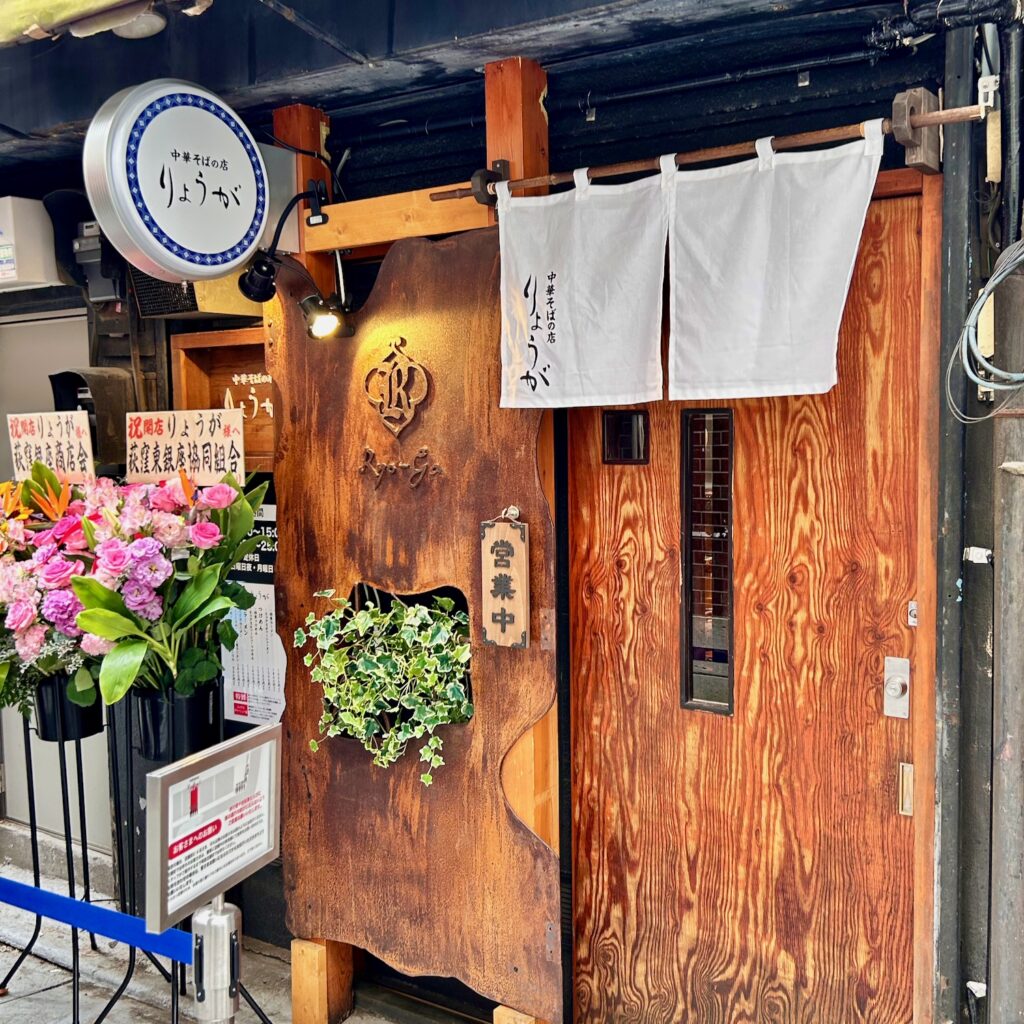
Opening June 11, 2025. (Relocation from rented space in Chitose Karasuyama)
When talking about ramen history in Tokyo, people from Nagano Prefecture play a big role. The “Marucho(丸長)” group started with several people from Nagano Prefecture. The same can be said for “Taishouken(大勝軒)” and “Marushin(丸信)”, which branched out from there. “Harukiya(春木屋)”, which is also popular in Ogikubo, is also part of a different group, but is from Nagano Prefecture. The founder of “Ikomanken(生駒軒)”, which at one time expanded to 130 shops, is from Yamanouchi Town, the same place as Yamagishi(山岸) of “Higashi-Ikebukuro Taishouken(東池袋大勝軒)”. It’s amazing that two people from a small town have become so successful in Tokyo. Relatively recently, Shinshu’s charismatic Tsukada(塚田) opened “Gyorai(魚雷)” and “Retsushi Junmei(烈士洵名)”. “Suzume Shokudo(すずめ食堂)”, opened in 2013 by Tanaka(田中) of the “Yuiga(ゆいが)” group, which operates mainly in Nagano City, was recently renovated to “Yamasuzume(ヤマスズメ)” (Oshiage sta.), and became a hot topic. And this “Ryoga(りょうが)” is also a new brand of a powerful restaurant that operates 8 shops (and 5 other franchise shops) under 4 brands mainly in Matsumoto City. What’s more, it is opening a shop in Ogikubo, the mecca of Tokyo ramen, which is amazing.
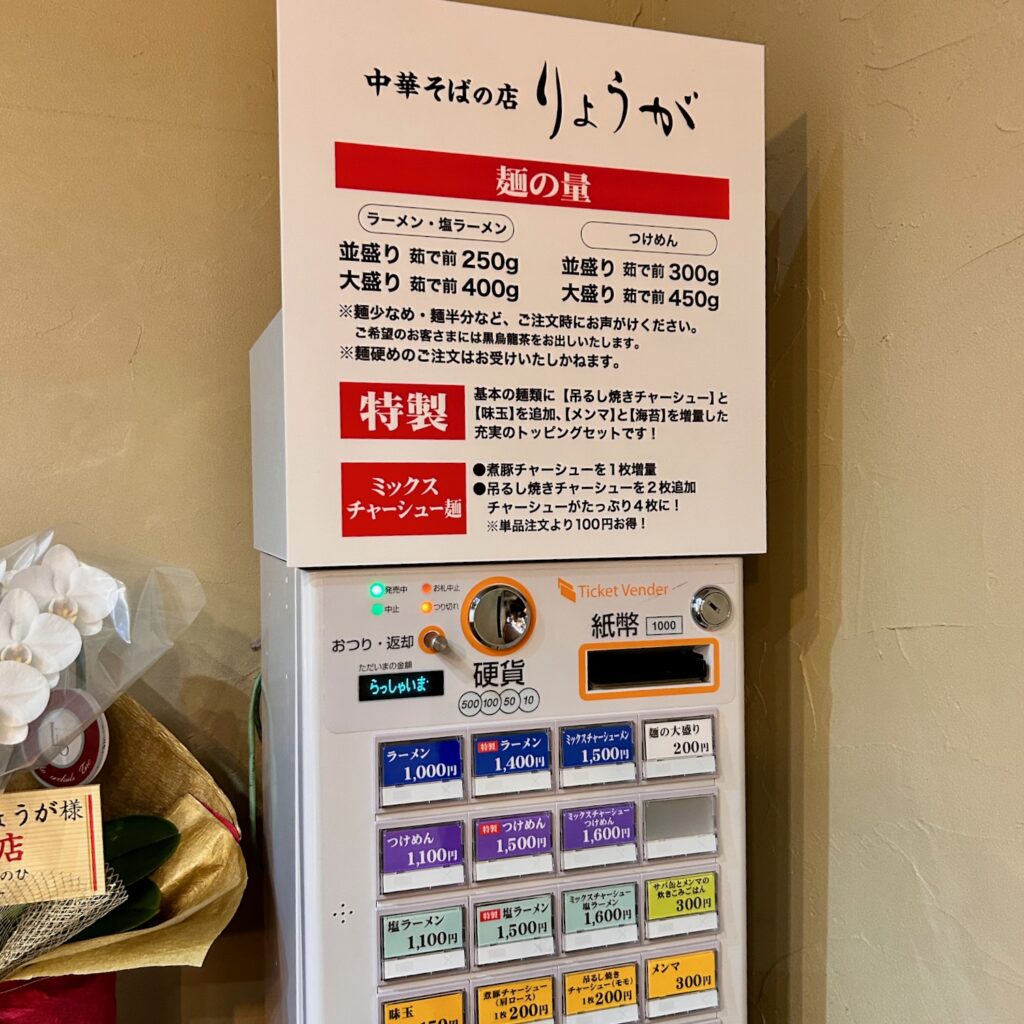
I arrived at 11:10 on the second day of opening and was the third person in line. By the time I left, there were about 5 people waiting.
As for the taste of the ramen, it was inspired by “Benten(べんてん)” and “Tosioka(としおか)”, which are the owner’s favorites at the moment, and he has been eating at these two restaurants a lot for the past year. And the fact that they serve ramen and tsukemen based on those flavors as the basic menu is enough to excite ramen lovers. Moreover, since they opened a store in Ogikubo, they had to do something, so they prepared a secret menu inspired by “Marucho(丸長)” (Ogikubo sta.). If you say “Ogikubo!” when you hand over the ticket for the tsukemen, they will bring it to you.
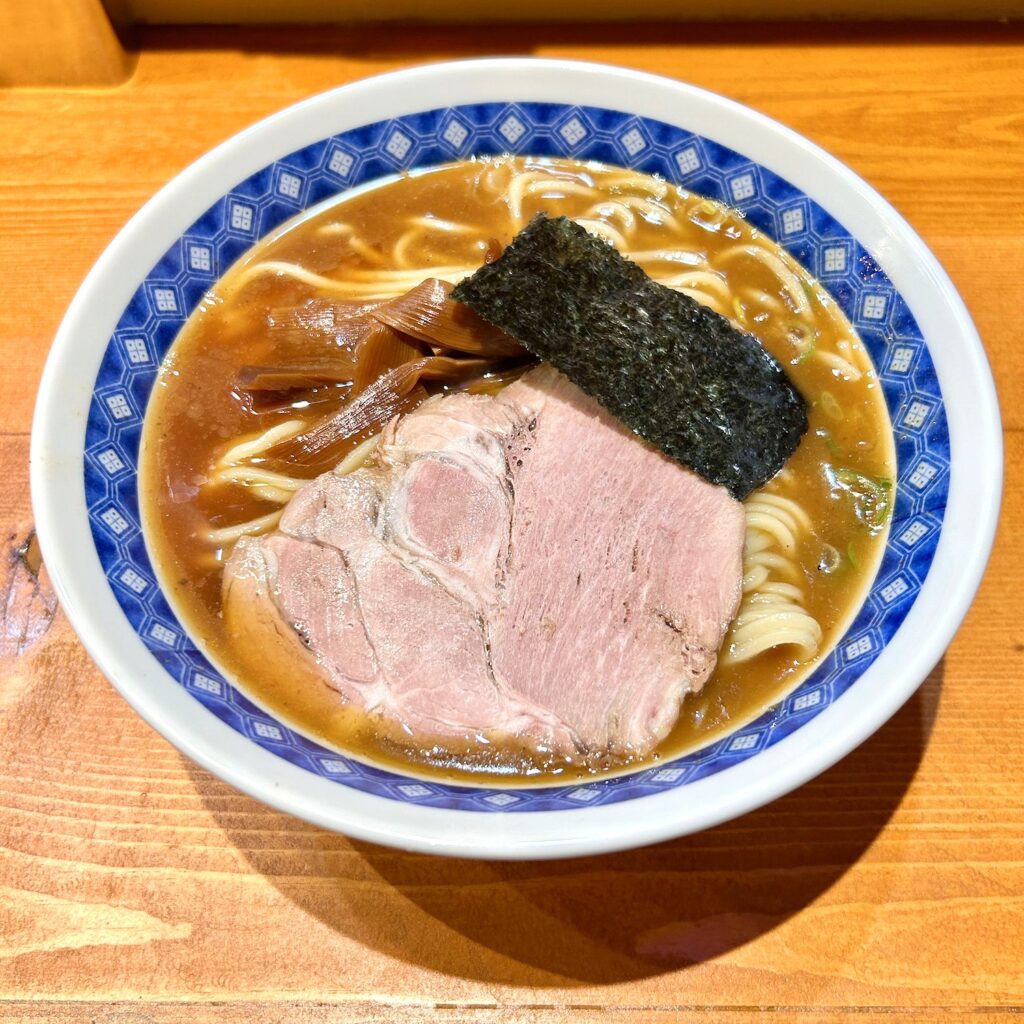
So, after asking if it was possible to eat both, I ordered ramen for 1000 yen and tsukemen for 1100 yen, saying “Ogikubo!”. There was also a topping of hang-roasted pork (thigh: 200 yen) available for a fee, so I added that to the tsukemen.
First, the ramen. It definitely had a “benten(べんてん)” feel, with the use of their specialty dried sardines. The bowl and noodles (Mikawaya Seimen) were quite similar, but the soup seemed to be moderate on purpose. The taste itself was really good. It had the power to make you eat 250g of noodles.
And the tsukemen. Wow, it looks just like the original. It must be quite difficult to make two soups, so it feels like an arrangement, but I really like it. Those who have finished eating also place a bowl of dipping sauce on their plate and ask for a “soup dilution please(スープ割下さい Soup-wari kudasai)” in the “Marucho style.” By the way, it’s only the second day since the shop opened and they don’t have any official social media accounts. So the secret menu is probably only known to a select few, but all the people who order tsukemen are probably from Ogikubo (lol). They get information quickly, or something like that.
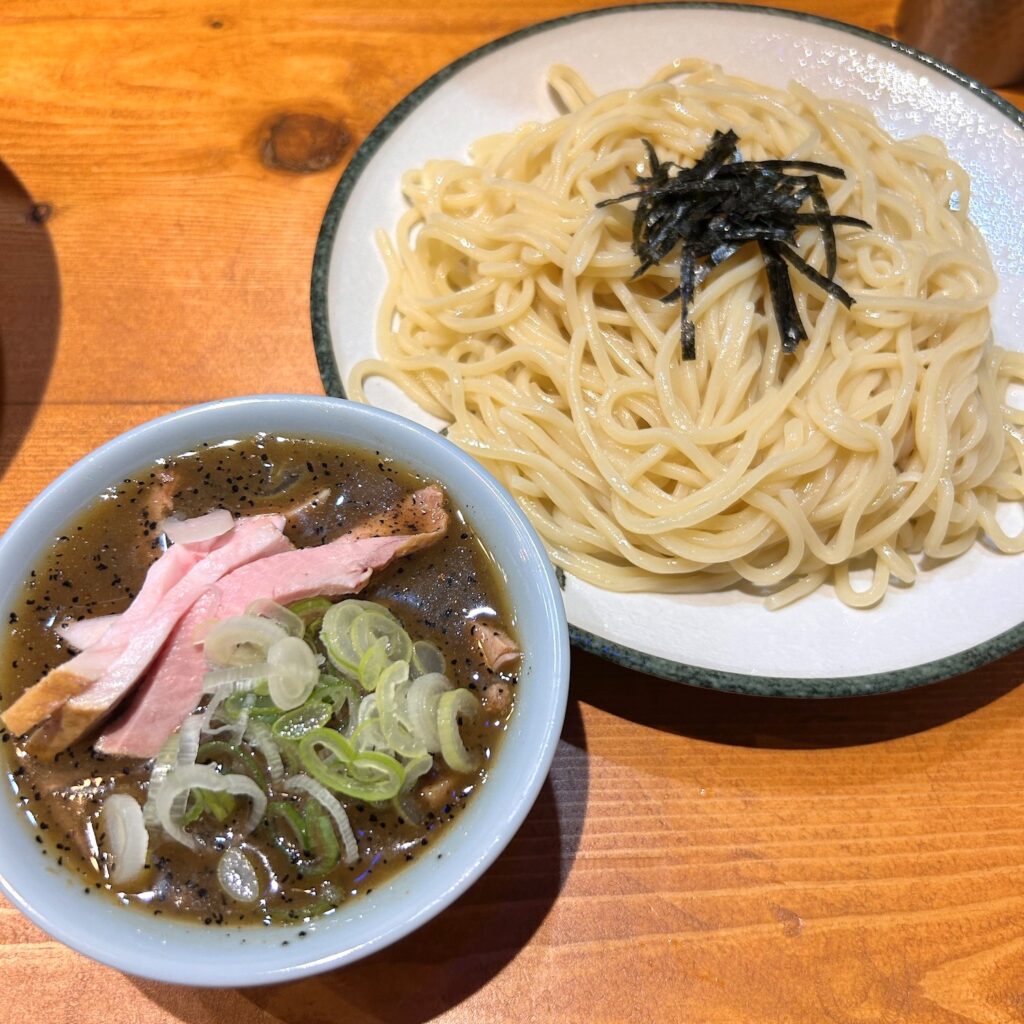
I was curious about their relationship with Minohi(みのひ), so I asked, and it turns out they are friends who frequent Benten and Toshioka. That’s interesting, too. They both use the same Mikawaya Seimen noodles, but they seem to have made some changes. In that sense, it’s interesting to compare the noodles.
Personally, I have to come and try the salt and regular tsukemen as well. Both the ramen and the tsukemen were so good that I thought so., but it’s even hotter in the kitchen, so he should take action before he collapse. (^^;
Shop Information
Chinese Noodle Shop Ryouga(中華そばの店 りょうが) Official information
1-4-9 Kamiogi, Suginami-ku, Tokyo 167-0043
Autor of this article
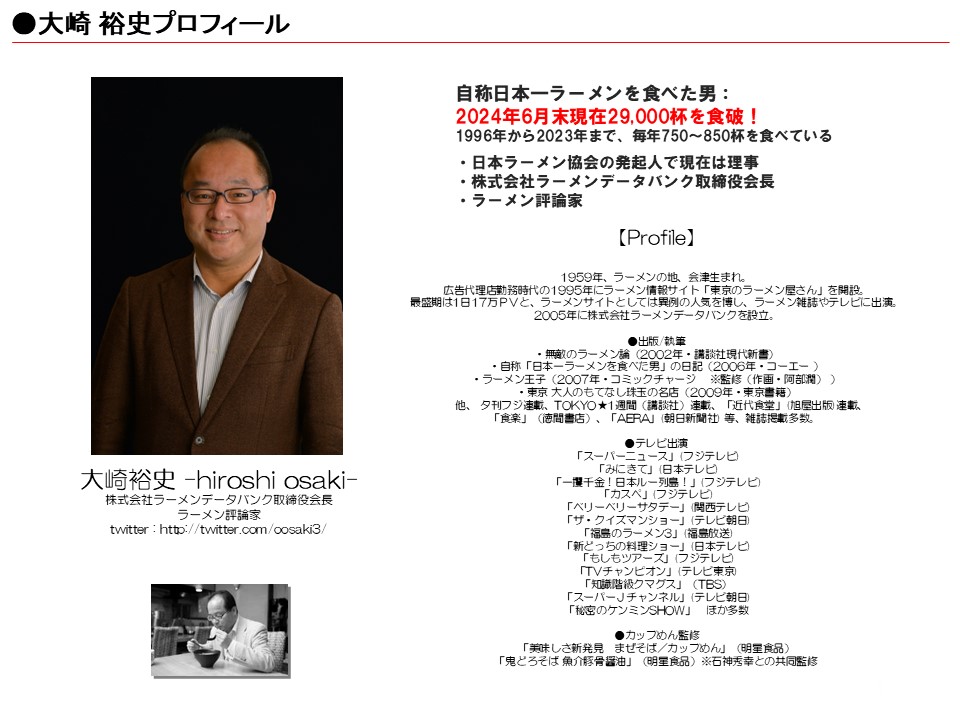
■Hiroshi Osaki (大崎 裕史); Chairman of the Board of Directors of Ramen Databank Co., Ltd. One of the founders of the Japan Ramen Association. Executive Committee Chairman of the Tokyo Ramen Festa. Born in 1959 in Aizu, the land of ramen. While working at an advertising agency, he launched the ramen information site “Tokyo Ramen Shops” in 1995. Founded Ramen Databank Co., Ltd. in 2005. Became chairman of the board of directors in 2011. He has appeared in many magazines and on television as “the man who calls himself the man who has eaten the most ramen in Japan” (as of the end of June 2024, he has eaten about 14,000 ramen shops and about 29,000 bowls). His books include “Muteki no Ramenron” (The Invincible Ramen Theory) (Kodansha Shinsho) and “Nihon Ramen Hishi(Japan Ramen Hidden Story)” (Nihon Keizai Shimbun Publishing).
